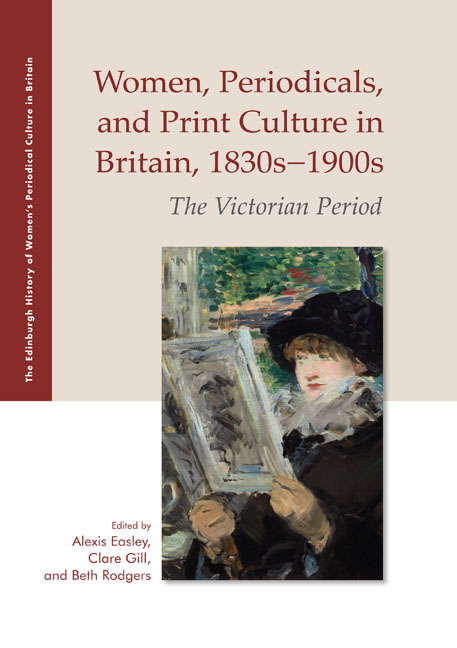Book contents
- Frontmatter
- Contents
- List of Illustrations
- Acknowledgments
- Introduction: Women, Periodicals, and Print Culture in the Victorian Period
- Part I (Re)Imagining Domestic Life
- (Re)Imagining Domestic Life: Introduction
- 1 The Rise and Rise of the Domestic Magazine: Femininity at Home in Popular Periodicals
- 2 Regulating Servants in Victorian Women's Print Media
- 3 Women Editors’ Transnational Networks in the Englishwoman's Domestic Magazine and Myra's Journal
- 4 Women and Family Health in the Mid-Victorian Family Magazine
- 5 Negotiating Female Identity in Nineteenth-Century Ireland
- 6 Women and the Welsh Newspaper Press: The Cambrian News and the Western Mail, 1870–1895
- Part II Constructing Modern Girls and Young Women
- Part III Women and Visual Culture
- Part IV Making Space for Women
- Part V Constructing Women Readers and Writers
- Part VI Intervening in Political Debates
- Notes on Contributors
- Index
- Plate section
4 - Women and Family Health in the Mid-Victorian Family Magazine
from Part I - (Re)Imagining Domestic Life
Published online by Cambridge University Press: 25 October 2019
- Frontmatter
- Contents
- List of Illustrations
- Acknowledgments
- Introduction: Women, Periodicals, and Print Culture in the Victorian Period
- Part I (Re)Imagining Domestic Life
- (Re)Imagining Domestic Life: Introduction
- 1 The Rise and Rise of the Domestic Magazine: Femininity at Home in Popular Periodicals
- 2 Regulating Servants in Victorian Women's Print Media
- 3 Women Editors’ Transnational Networks in the Englishwoman's Domestic Magazine and Myra's Journal
- 4 Women and Family Health in the Mid-Victorian Family Magazine
- 5 Negotiating Female Identity in Nineteenth-Century Ireland
- 6 Women and the Welsh Newspaper Press: The Cambrian News and the Western Mail, 1870–1895
- Part II Constructing Modern Girls and Young Women
- Part III Women and Visual Culture
- Part IV Making Space for Women
- Part V Constructing Women Readers and Writers
- Part VI Intervening in Political Debates
- Notes on Contributors
- Index
- Plate section
Summary
THIS CHAPTER EXPLORES the role of women in the treatment of health, as represented in the Family Herald and Cassell's Illustrated Family Paper (later Cassell's Magazine) from the mid-1850s to the 1870s. These magazines were by their nature miscellaneous, serving both as a vehicle for fiction and as a source of advice on a range of domestic matters, including personal and family health. As such, they played multiple roles in their readers’ lives, offering working-class and lower-middle-class women assistance with the practical challenges of domestic management, as well as an imaginative escape from its prosaic realities. In fiction, advice features, and correspondence columns, treating illness and maintaining the family's health are defined as important facets of women's domestic responsibilities.
In 1857, Cassell's Illustrated Family Paper introduced a new column by a nononsense contributor called ‘The Matron.’ Writing to respectable working-and lower-middle-class women readers, she pours cold water on the flowery descriptions of domestic womanhood so popular at the time. She dismisses the typical paean to women's selflessness, moral courage, tenderness, and religiosity with the frank remark, ‘I can't say that I think it worth much’ (5 Dec 1857: 7). She warns against supposing that ‘the ability to “fetter males,” to “bind brows,” to “soothe dying moments,” and to “water turfs” with “choicest tears”’ will be of any help to wives and mothers who must take on the endless practical work of maintaining a household (7). Rather, she insists, women must practise the ‘prudence in marketing, skill in training children, and dexterity in domestic duties’ that make a good wife ‘for humble tradesmen, [and] for the large class of artizans and mechanics, who, above all others, require wives that shall be, indeed, help meets’ (7).
The Matron identifies a contrast shown elsewhere in Cassell's and other family magazines between the idealised Victorian woman, who holds the family together through her moral and spiritual power, and the unromantic domestic manager, who enacts the labour necessary for the home to function. According to both stereotypes, women are defined as working in the domestic sphere on behalf of their husbands and children, but they otherwise encode starkly different characteristics and capabilities.
- Type
- Chapter
- Information
- Women, Periodicals and Print Culture in Britain, 1830s–1900sThe Victorian Period, pp. 57 - 68Publisher: Edinburgh University PressPrint publication year: 2019



